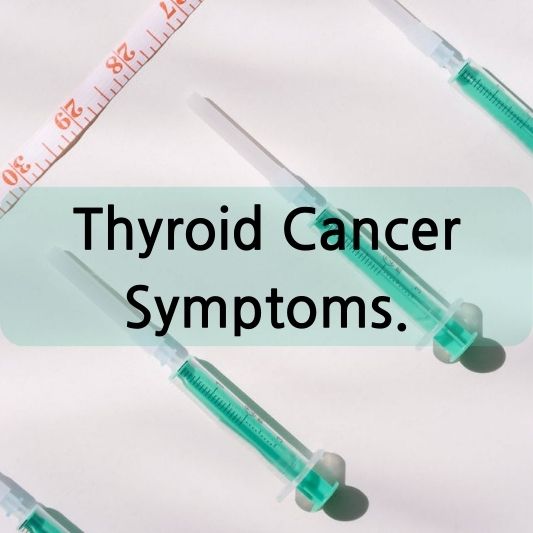Thyroid cancer is a condition characterized by the abnormal growth of cells in the thyroid gland, leading to the formation of tumors. While thyroid cancer may not always exhibit noticeable symptoms in its early stages, understanding the signs and symptoms associated with this condition is crucial for early detection and prompt treatment.

Thyroid cancer Common Symptoms
- Lump or Swelling in the Neck: One of the most common symptoms of thyroid cancer is the presence of a lump or swelling in the neck, often near the thyroid gland. This lump may gradually increase in size and can sometimes be accompanied by pain or discomfort.
- Changes in Voice: Thyroid cancer can affect the nerves that control the vocal cords, leading to changes in voice such as hoarseness or difficulty speaking.
- Difficulty Swallowing or Breathing: As thyroid tumors grow larger, they may exert pressure on the nearby structures in the neck, causing difficulty in swallowing or breathing.
- Persistent Cough: A persistent cough that is not associated with other respiratory conditions may also be a symptom of thyroid cancer, especially when accompanied by other symptoms such as hoarseness or difficulty swallowing.
Less Common Symptoms
While the symptoms mentioned above are more commonly associated with thyroid cancer, some individuals may experience less common symptoms, including:
- Neck Pain: Persistent pain or discomfort in the neck region, especially around the thyroid gland, may indicate the presence of thyroid cancer.
- Swollen Lymph Nodes: Enlarged or swollen lymph nodes in the neck may be a sign that thyroid cancer has spread to nearby lymph nodes.
- Fatigue and Weakness: Thyroid cancer can affect the body’s metabolism, leading to symptoms such as fatigue, weakness, and unexplained weight changes.
- Changes in Bowel Habits: In some cases, thyroid cancer may cause changes in bowel habits, including diarrhea or constipation, which are not attributed to other digestive issues.
Understanding these symptoms and promptly seeking medical attention can aid in the early diagnosis and treatment of thyroid cancer, potentially improving outcomes and prognosis for affected individuals.
Conclusion
In conclusion, being aware of the signs and symptoms associated with thyroid cancer is crucial for early detection and timely intervention. While thyroid cancer symptoms may vary from person to person, any persistent changes or abnormalities in the neck region should be evaluated by a healthcare professional. By understanding the symptoms, individuals can take proactive steps towards diagnosis, treatment, and management of thyroid cancer.
FAQs (Frequently Asked Questions)
What are the risk factors for developing thyroid cancer?
Several factors, including gender, age, radiation exposure, family history, and genetic conditions, can increase the risk of developing thyroid cancer.
How is thyroid cancer diagnosed?
Diagnosis often involves a combination of physical examination, imaging tests (such as ultrasound or CT scan), and biopsy of the thyroid tissue.
What are the treatment options for thyroid cancer?
Treatment options for thyroid cancer may include surgery, radioactive iodine therapy, thyroid hormone therapy, external beam radiation therapy, and chemotherapy, depending on the type and stage of cancer.
Can thyroid cancer be prevented?
While the exact cause of thyroid cancer is often unknown, certain preventive measures such as avoiding radiation exposure and maintaining a healthy lifestyle may help reduce the risk.
What is the prognosis for thyroid cancer?
The prognosis for thyroid cancer varies depending on factors such as the type and stage of cancer, but early detection and appropriate treatment can significantly improve outcomes.
Learn more about Thyroid Cancer!
